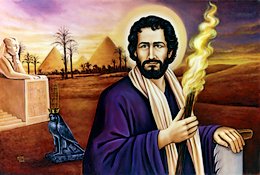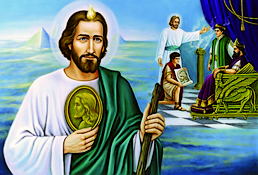|
|
Post by Elizabeth on Oct 28, 2019 20:56:29 GMT
Saints Simon and Jude
Apostles and Martyrs
(† First Century)
St. Jude, Patron of "hopeless" cases
Simon was a simple Galilean, a brother of Jesus, as the ancients called one's close relatives — aunts, uncles, first cousins; he was one of the Saviour's four first cousins, with James the Less, Jude and Joseph, all sons of Mary, the wife of Alpheus, or Cleophas, either name being a derivative of the Aramaic Chalphai. The latter was the brother of Saint Joseph, according to tradition. All the sons of this family were raised at Nazareth near the Holy Family. (See the Gospel of Saint Matthew 13:53-58.) Simon, Jude and James were called by Our Lord to be Apostles, pillars of His Church, and Joseph the Just was His loyal disciple. Saint Simon the Zealot or the Zealous, was the name this Apostle bore among the twelve. He preached in Egypt, Mauritania (Spain), and Lybia, leaving behind him the fertile hills of Galilee, where he had been engaged in the healthful cultivation of the vineyards and olive gardens. He later rejoined his brother, Saint Jude, in Persia, where they labored and died together. At first they were respected by the king, for they had manifested power over two ferocious tigers who had terrorized the land. With the king, sixty thousand Persians became Christians, and churches rose over the ruins of the idolatrous temples. The Apostle, Saint Jude The Apostle, Saint Jude O.D.M. pinxit But the ancient enemy, who never sleeps, rose up, and when the two went elsewhere the pagans commanded them to sacrifice to the sun. Both Apostles, just before that time, had seen Our Lord amid His Angels. Simon said to Jude, One of the Angels said to me, I will take you out of the temple and bring the building down upon their heads. I answered him, Let it not be so; perhaps some of them will be converted. They prayed for mercy for the people and offered their lives to God. Saint Simon told the crowd that their gods were only demons, and ordered them to come out of the statues, which they did, revealing themselves under hideous forms. But the idolaters fell on the Apostles and massacred them, while they blessed God and prayed for their murderers. Saint Jude has left us a short but powerful epistle, written after the death of his brother James, bishop of Jerusalem, and addressed to the new Christians being tempted by false brethren and heretics. |
|
|
|
Post by Admin on Oct 28, 2020 12:36:20 GMT
October 28 – Sts Simon and Jude, Apostles
Instead of thy fathers, sons are born to thee. Thus does the Church, disowned by Israel, extol in her chants the apostolic fruitfulness which resides in her till the end of time. Yesterday she was already filled with that loving hope which is never deceived, that the holy Apostles Simon and Jude would anticipate their solemnity by shedding blessings upon her. Such is the condition of her existence on earth, that she can remain here only as long as she continues to give children to our Lord; and therefore, in the Mass of the 27th of October, she makes us read the passage of the Gospel where it is said: I am the true vine, and my Father is the husbandman. Every branch in me, that beareth not fruit, he will take away: and every one that beareth fruit, he will purge it, that it may bring forth more fruit. The pruning is painful, as the Epistle of the Vigil points out. In the name of the other branches, honored like himself with the divine election, the Apostle there recounts the labors, sufferings of every description, persecutions, revilings, denials, at the cost of which the preacher of the Gospel purchases the right to call sons those whom he has begotten in Christ Jesus. Now, as St. Paul more than once repeats, especially in the Epistle of the feast, this supernatural generation of the Saints is nothing else but the mystical reproduction of the Son of God, who grows up in each of the elect from infancy to the measure of the perfect man. However meager in details be the history of these glorious Apostles, we learn from their brief Legend how amply they contributed to this great work of generating sons of God. Without any repose, and even to the shedding of their blood, they edified the Body of Christ; and the grateful Church thus prays to our Lord today: “O God, who by means of thy blessed Apostles Simon and Jude hast granted us to come to the knowledge of thy name; grant that we may celebrate their eternal glory by making progress in virtues, and improve by this celebration.” St. Simon is represented in art with a saw, the instrument of his martyrdom. St. Jude’s square points him out as an architect of the house of God. St. Paul called himself by this name; and St. Jude, by his Catholic Epistle, has also a special right to be reckoned among our Lord’s principal workmen. But our Apostle had another nobility, far surpassing all earthly titles: being nephew, by his father Cleophas or Alpheus, to St. Joseph, and legal cousin to the Man-God, Jude was one of those called by their compatriots the brethren of the carpenter’s Son (Together with James the Less, Apostle and first Bishop of Jerusalem, a certain Joseph less known, and Simeon, second Bishop of Jerusalem, all sons of Cleophas, and of our Lady’s step-sister called in St. John Mary of Cleophas). We may gather from St. John’s Gospel another precious detail concerning him. In the admirable discourse at the close of the Last Supper, our Lord said: “He that loveth me, shall be loved of my Father: and I will love him and will manifest myself to him.” Then Jude asked him: “Lord, how is it, that thou wilt manifest thyself to us, and not to the world?” And he received from Jesus this reply: “If any one love me, he will keep my word, and my Father will love him, and we will come to him, and will make our abode with him. He that loveth me not, keepeth not my words. And the word which you have heard is not mine, but the Father’s who sent me.”
 Ecclesiastical history informs us that, towards the end of his reign, and when the persecution he had raised was at its height, Domitian caused to be brought to him from the East two grandsons of the Apostle St. Jude. He had some misgivings with regard to these descendants of David’s royal line, for they represented the family of Christ himself, whom his disciples declared to be king of the whole world. Domitian was able to assure himself that these two humble Jews could in no way endanger the Empire, and that if they attributed to Christ sovereign power, it was a power not to be visibly exercised till the end of the world. The simple and courageous language of these two men made such an impression on the emperor that, according to the historian Hegesippus, from whom Eusebius borrowed the narrative, he gave orders for the persecution to be suspended. We have only to add to the following brief notice of our Apostles that the churches of St. Peter in Rome and Saint-Sernin at Toulouse dispute the honor of possessing the greater part of their holy remains. I have chosen you; and have appointed you, that you should go, and should bring forth fruit, and your fruit should remain. These words were addressed by the Man-God to you, as to all the twelve, as the Church reminded us in her Night Office. And yet, what remains now of the fruit of your labors in Egypt, in Mesopotamia, in Persia? Can our Lord and his Church be mistaken in their words, or in their appreciations? Certainly not; and proof sufficient is that, above the region of the senses, and beyond the domain of history, the power infused into the twelve subsists through all ages, and is active in every supernatural birth that develops the mystical Body of our Lord and increases the Church. We, more truly than Tobias, are the children of saints; we are no longer strangers, but the family of God, his house built upon the foundation of Apostles and Prophets, united by Jesus the chief cornerstone. All thanks be to you, O holy Apostles, who in labor and sufferings procured us this blessing; maintain in us the title and the rights of this precious adoption. Great evils surround us; is there any hope left to the world? The confidence of thy devout clients proclaims thee, O Jude, the patron of desperate cases; and for thee, O Simon, this is surely the time to prove thyself Zelotes, full of zeal. Deign, both of you, to hear the Church’s prayers; and aid her, with your apostolic might, to re-animate faith, to rekindle charity, and to save the world.
|
|





